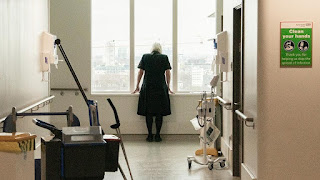Alison Forde checked the latest figures before leaving for the Royal London Hospital. At 6 am, 30 patients in a&e (accident and emergency) required a bed, half of them covid patients. Six people had been waiting for more than four hours. An 82 year old man arrived yesterday was waiting for 15 hours. The risk of dying increases if a patient is not treated inside six hours.
Alison’s team was shrinking. Out of her core team of
eleven, three were off sick, and one was isolating with covid symptoms. In the
early months, the hospital had suspended all routine work, including cancer
treatment. In January, the sickest covid patients were earmarked for Royal
London.
*****
As the Head of
Site Operations, Alison’s main job is to allocate patients to key areas of
the hospital. A&E is the clearing house for admissions. From there, she
moves patients to respiratory wards to give oxygen via masks or nasal tubes. Or
to intensive care which now has three floors (earlier one). Every day Alison
was confronted with a brutal fact. There weren’t enough beds. The hospital
chain had only ten spare intensive care beds. The entire system was on the
verge of grinding to a halt. People who could be cured in pre-pandemic time may
not survive now.
After ten months, survival rates had improved, which
had aggravated the situation. People now stayed on life support for long, which
made intensive care beds scarcer. Earlier, death was the primary mechanism of
discharge.
*****
08.30 am was huddle time for Alison’s team. Here they
planned the day. Now, with social distancing, the team occupied the entire corridor.
Some members struggled to hear what was being said.
NHS in general, and Royal London in particular, has
set capacity benchmarks. The number of ambulances waiting to offload patients,
waiting patients, bed occupancy, staffing rates and such. The system triggers alarms.
For example, a patient waiting beyond certain time will be sent to another
hospital. But now, with all hospitals overflowing, those alarms made no sense.
Alison had simply changed the parameters.
The 82-year old fortunately got a bed at 07.15 after
waiting for 16 hours.
*****
Novel tasks were added as a result of covid
precautions. Every day, piles of clinical waste from intensive care, including
heaps of soiled personal protective equipment had to be disposed. They packed
the store rooms to the ceiling. The logistics of disposing the waste mountains
was looked over by Alison.
At lunchtime, Alison felt overwhelmed. She sat in the
corner and cried a little. Her team was a little surprised to see her state.
She is known as the cool cucumber.
When the pandemic started, Alison was extremely
worried about contracting coronavirus. Every day, each doctor would visit her
office to get three or four death certificates signed. Some hospital employees
died as well. Every time she coughed, she thought she had covid. To avoid the
Tube, she started cycling to the hospital. She fell off, fractured her jaw, cut
her lip, ligament and wrist, and needed two operations. But her fear of covid
disappeared since.
*****
The hospital is considering adding another unit. That
would mean diluting the nurse-patient ratio further. Normally one nurse for two
is the maximum allowed; now one nurse takes care of four.
At 4.30 pm, 31 patients were waiting for more than
four hours in a&e. By 8 pm, more than sixty.
Alison’s 12 hour shift finished at 08.30 pm, but she
can never leave before 9 pm. She caught the bus home, had a cup of tea, a quick
cold sandwich. She did a bit of cleaning, more to distract herself. After
checking the morning alarm, she went to bed.
*****
P.S. For 1843
magazine, Simon Akam interviewed Alison Forde, who described her 15 January
2021. This article presents it in a compressed form. For health administrators
in Brazil, India and other developing countries, working days are even more
terrible. Fortunately for Alison, the situation in London has now improved.
Ravi

A real hero who has only been offered 1% pay rise
ReplyDeleteआपल्या तर जास्तच भयावह परिस्थिती आहे नाही का?
ReplyDelete